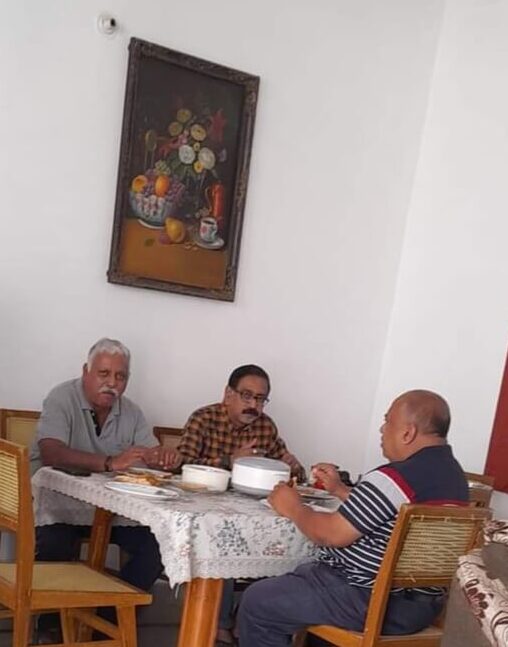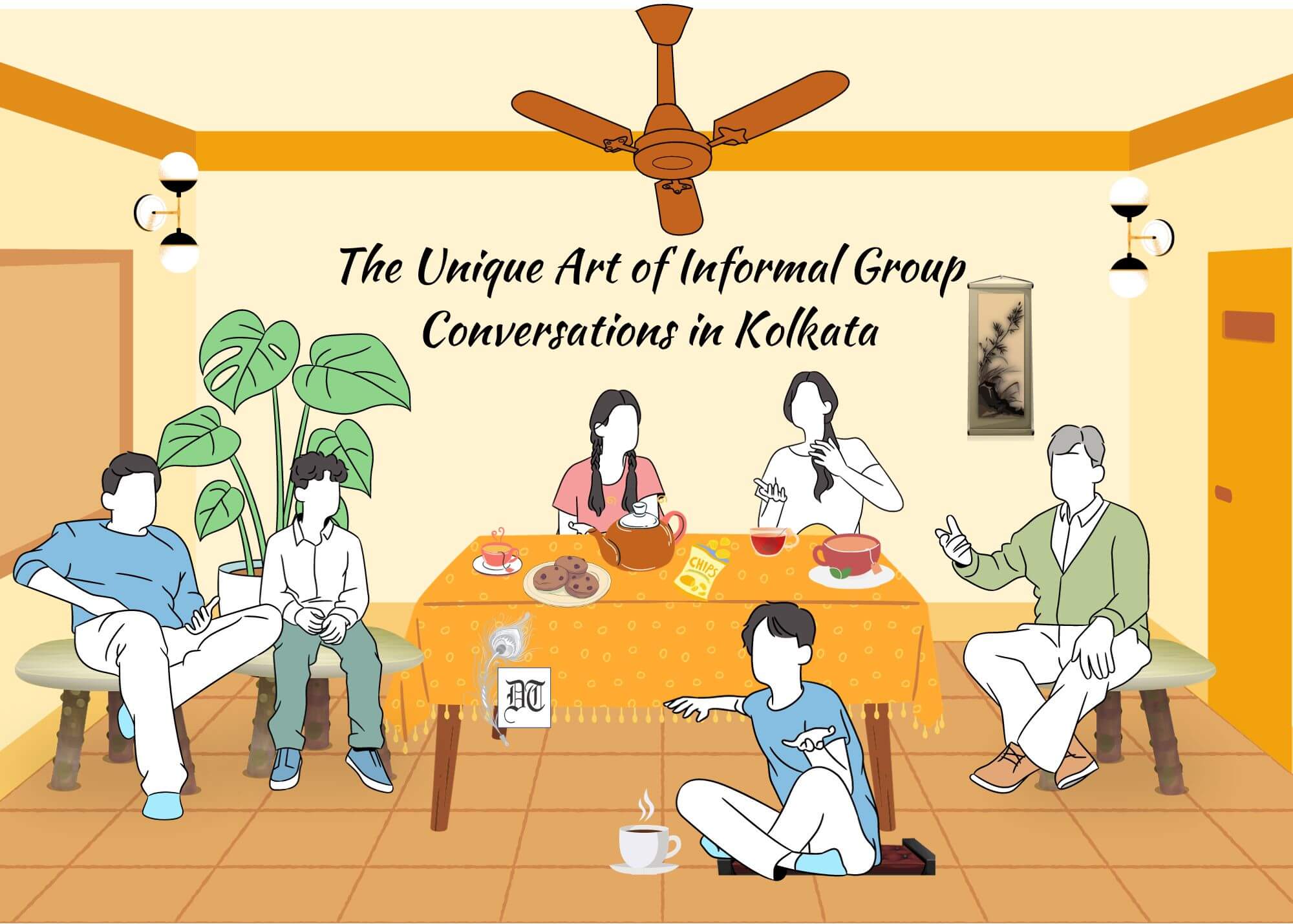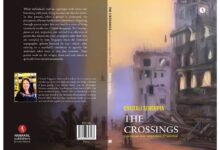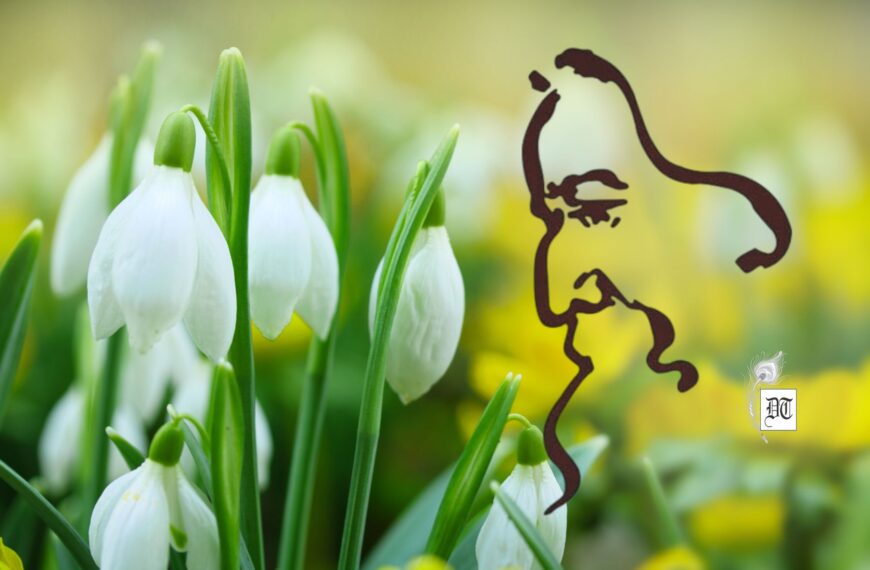Adda, a cornerstone of Bengali culture since the time of Tagore, has always thrived on connection and inclusivity, elucidates Madhuri, exclusively for Different Truths.
Although adda is a beloved pastime throughout Kolkata, the long, cerebral conversations that the city is famous for started to become an issue during Covid-19. By August 2020, more than 200 prosecutions were being made each day in Kolkata, most of whom were also engaging in adda.
Adda is a beloved pastime that’s unique to Kolkata. Markedly different to small talk or chatting, it is best described as an informal group conversation that’s long, fluid, and relaxed. While adda may be loosely translated as “hangout”, this loses the nuances and oversimplifies the action.
“We are not expected to produce something out of an adda,” Aditi Ghosh, head of the linguistics department at the University of Calcutta, described, “It is a kind of unplanned mental exercise where we do not just talk about ourselves and our families, but we go beyond that. It is about ideas and events happening all around us.”
For Bengalis… engaging in adda is an essential part of the day.
For Bengalis, who are known for their gregariousness and love of talking, engaging in adda is an essential part of the day. Traditionally, a perfect adda should include a little bit of everything – politics, art, literature, science, debate, gossip, jokes, rumours, food, cigarettes, and tea – and can take place anywhere: in a private home, a local tea shop, the park, or a veranda.

Sometimes it is impromptu and happens right on the street (and can continue for hours right there) or it may be a regular, pre-planned meet-up. An adda session can be identified by the freestyle conversation that’s often intellectual, sometimes banter, and by the wild gesticulations of participants as they make their contributions heard. If things get quiet for too long, someone will broach a new subject to keep the session going. There is no restriction on the topics of these conversations, though the more controversial the subject matter and the more outlandish a claim, the better. It is a kind of unplanned mental exercise where we do not just talk about ourselves and our families, but we go beyond that. It is about ideas and events happening all around us.
Although the origins of adda are murky, this beloved ritual is thought to go back to colonial times. In 1757, the English East India Company won the Battle of Plassey and gained control over most of Bengal. Back then, Kolkata was a cluster of humble settlements on the left bank of river Hooghly, but it quickly expanded into a city under British rule, serving as the capital of British India from 1772 to 1911. The British colonialists left indelible marks on Kolkata’s cultural heritage, influencing food, language, literature, philosophy and even the art of conversation.
The city soon attracted rich merchants and traders from all over Bengal. A new affluent Bengali class emerged who worked as clerks, administrators, and merchants under the English East India Company. These educated and wealthy Bengali males tutored their children in contemporary Western subjects to get jobs with the East India Company and do business with them smoothly and gathered daily in their private premises to partake in casual but long discussions on endless topics – thus popularising adda.
Today we head out for an adda, mostly a regular weekend activity for some of us.
Today we head out for an adda, mostly a regular weekend activity for some of us. Yet my non-Bong friends are a bit mystified by the term adda, as in Hindi and as immortalised by Bollywood, it means the den of vices. Well, the Bong adda is the den of vices for sure, but they are more of a harmless variety. The essence of the word is essentially Bengali and synonymous with Bengali culture and tradition. It usually takes place among friends, relatives, or colleagues. Adda manifests itself everywhere in embryonic form. From the Egyptians or Turks chilling out with a cup of coffee or the Americans guzzling bear in a pub – everybody is found relaxed, relieved, and deeply engrossed in a typical adda mood, some time or the other. Adda is best seen during the festivals.
So, what is adda? Adda is a discussion/chat/verbal conflagration with a few ground rules:
- · Adda isn’t about winning, it is about being passionate
- · Adda isn’t about confinement but about exploration
- · Adda is not so much about judging as it is about accepting
- · Adda isn’t about exclusion, it is about inclusion
- · Adda isn’t about being repressive, it is about being expressive
- · Adda is most definitely not about business talks, but it is a lot about ideas
- · Adda is not about deal-making but is a lot about making a great deal of passion-inducing things
- · Adda is unpaid therapy as also a multiplicity of perspectives
- · Adda is about renewing connections
- · Adda is a melting pot of living and experiencing
- · Adda is about being true to one’s heart, and one knows how true one is, time flies.
Adda is a lot about bitching, gossiping, catcalling and everything mundane and inane…but that is the superficial. At a deeper level, it is about connecting, resonating, and bonding. For all the ‘intellectualism’ of the mind the heart does return satiated, and the soul succoured from an adda.
For among those who adda regularly, one has not heard of eve teasing…
For among those who adda regularly, one has not heard of eve teasing taking place when the ‘youths’ of the lane sat around “adda-maroing”, news and media had competition as each topic gets dissected by a variety of viewpoints, the stress of living was a lot reduced and there was no participation cost other than for the endless cups of tea. The idiot box held no sway. One could be an idiot in one’s unique way. But nothing beats a good evening of face-to-face chat.
For those who don’t know what adda is, it ranges from discussing Marxism to the price of hilsa, from reciting Yeats to lines broken into three parts to form poetry, from talks about Beethoven to modern-day Tumpa Shona. All this happened in crumbling canteens, the walls of which lamented their decay, over the flavoured water called coffee at Coffee House or tea stalls with rainwater dripping into cha-er bhand. Cold winter mornings saw men in monkey caps and loose pyjamas engrossed in heated animated discussions over communism as the way forward or separating art from the artist. Humidity, rain, cold nothing dampened its spirit.
Many people in India of smart cities, bustling tier two and three towns, Silicon hubs, historically famous towns etc. would place Calcutta in a forgotten, faded haze of past glory. But if I were to be born again and had a choice of places, I would choose Calcutta. Again, and again. I may have lived in many other cities, but the training and breeding ground of my mind was, thankfully, Calcutta. I am imbued with the original values of liberalism, progressiveness, inclusivity, secularism, and rationalism way before they are distorted into the unrecognisable woke sentiments of today.
The friends from the City of Joy have remained the same all these years, spreading joie de vivre…
The friends from the City of Joy have remained the same all these years, spreading joie de vivre in four corners of the world. I am rejuvenated with a fresh shot of Calcutta every time I visit and reconnect with those who choose to remain here. It is quite simply a reconnaissance with the age-old essence of a town that fuels spontaneous enjoyment of everyday things. A joyous bursting into song, the re-reading of the lines of a poem, the analysing of a winning strategy of a football match, discussing threadbare post-truth in a colonial club, deciphering the secret ingredient of a delicate dish – the list goes on. Adda!
Yes, I carry and practise its ethos every single day wherever I may be.
Picture design by Anumita Roy and photo by the author






 By
By
 By
By
Thank you for enticing your readers with Adda, in fluid and clear prose!